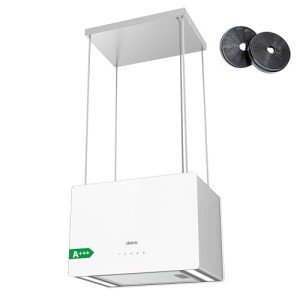10 Island Extractor Hood-Friendly Habits To Be Healthy
페이지 정보
작성자 Betsey 댓글 0건 조회 8회 작성일 25-05-20 07:31본문

Understanding Island Extractor Hoods: A Comprehensive Guide
In modern-day cooking areas, the role of an extractor hood, especially the island extractor hood, can not be overstated. These appliances not only improve the aesthetics of a kitchen but also play a vital role in preserving air quality. In this short article, we will explore what island extractors are, their benefits, types, installation factors to consider, maintenance pointers, and answer some often asked concerns to aid home cooks and homeowners in making informed decisions.

What is an Island Extractor Hood?
An island cooker hood black extractor hood, also referred to as an island range hood, is a kind of ventilation system that is suspended above a kitchen island cooktop, where cooking happens. Unlike traditional wall-mounted hoods, which are attached to walls, island hoods hang from the ceiling, providing unobstructed views and making sure efficient ventilation for all kinds of cooking activities.
Advantages of Island Extractor Hoods
island cookers extractor hoods provide a wide range Hood for island of advantages:
- Enhanced Air Quality: range hood for Island They effectively get rid of smoke, steam, and cooking odors, promoting a healthier kitchen environment.
- Visual Appeal: Available in different styles and finishes, island cooker extractor hood hoods can work as a sensational centerpiece in open-concept cooking areas.
- Flexibility: Many models include versatile ventilation choices, catering to both ducted and ductless configurations.
- Noise Reduction: Advanced innovation in modern-day extractor hoods often minimizes functional noise, permitting an enjoyable cooking experience.
- Lighting: Many island hoods are equipped with integrated lights that light up the cooking area, improving visibility throughout meal preparation.
Types of Island Extractor Hoods
When choosing an island extractor hood, you will experience several types. Here's a quick summary:
| Type | Description |
|---|---|
| Ducted | Ventilation system that requires ductwork to direct air outside your house. |
| Ductless | Utilizes filters to clean the air before recirculating it back into the kitchen; ideal for apartments. |
| Convertible | Can function as both ducted and ductless, providing versatility based upon the kitchen design. |
| Integrated | Developed directly into cabinets or lighting, offering a smooth, unobtrusive design. |
| Wall-mounted | Although not traditional island hoods, some wall-mounted hoods can be installed in a manner that serves kitchen islands. |
Installation Considerations
When installing an island cooker extractor hood, there are numerous important factors to consider:
- Height: The hood must be set up at a height of 28 to 30 inches above the cooktop to efficiently capture smoke and odors.
- Ventilation: Ensure appropriate ducting is offered if going with a ducted design, specifically in homes with complicated designs.
- Air flow Capacity: Choose a hood with sufficient CFM (cubic feet per minute) ranking to match the cooking device. As a guideline of thumb, increase the BTUs of your cooktop by 1.5 to figure out the required CFM.
- Power Supply: Verify that electrical wiring satisfies the hood's operational requirements. Seek advice from a technician if modification is needed.
Maintenance Tips for Island Extractor Hoods
Appropriate maintenance ensures the durability and efficiency of your island extractor hood. Follow these ideas:
- Regular Cleaning: Clean the outside surfaces and the grease filters regular monthly. The majority of filters can be washed in warm, soapy water.
- Inspect Light Fixtures: Inspect and replace bulbs as required to ensure the cooking location is well-lit.
- Inspect for Duct Blockages: If using a ducted system, periodically inspect ducts for blockages to guarantee optimum airflow.
- Screen Noise Levels: If your hood starts to make uncommon noises, check for loose parts or debris within the unit.
- Schedule Professional Maintenance: Consider having an expert check and service your hood annually to resolve any potential issues.
FAQs
What is the ideal CFM for an island extractor hood?
The ideal CFM depends upon your cooktop's BTU. For many home cooking, a range of 600 to 1200 CFM is suggested, depending upon the intensity of your cooking routines.
Can I install an island extractor hood myself?
While DIY installation is possible for those with experience, having an expert install your island hood is a good idea to make sure optimal performance and safety.
Are ductless island extractor hoods reliable?
Ductless hoods can be reliable in removing smoke and odors when equipped with premium filters, but they might not be as effective as ducted variations in ventilating hot air.
How often should I replace the filters?
For ductless models, it is suggested to replace the filters every 6 months to a year, depending on usage. Always describe the producer's guidelines for specifics.
Island extractor hoods elevate both the performance and aesthetic appeal of contemporary kitchens. With different types, setup choices, and upkeep tips, property owners can find the ideal service to fit their cooking requirements and style choices. By buying a quality island Range Hood For Island extractor hood, one not only enhances their cooking environment but likewise promotes a much healthier home. As you navigate alternatives, keep in mind to consider your kitchen island hood design and cooking habits to select a hood that perfectly fits your cooking way of life.
댓글목록
등록된 댓글이 없습니다.